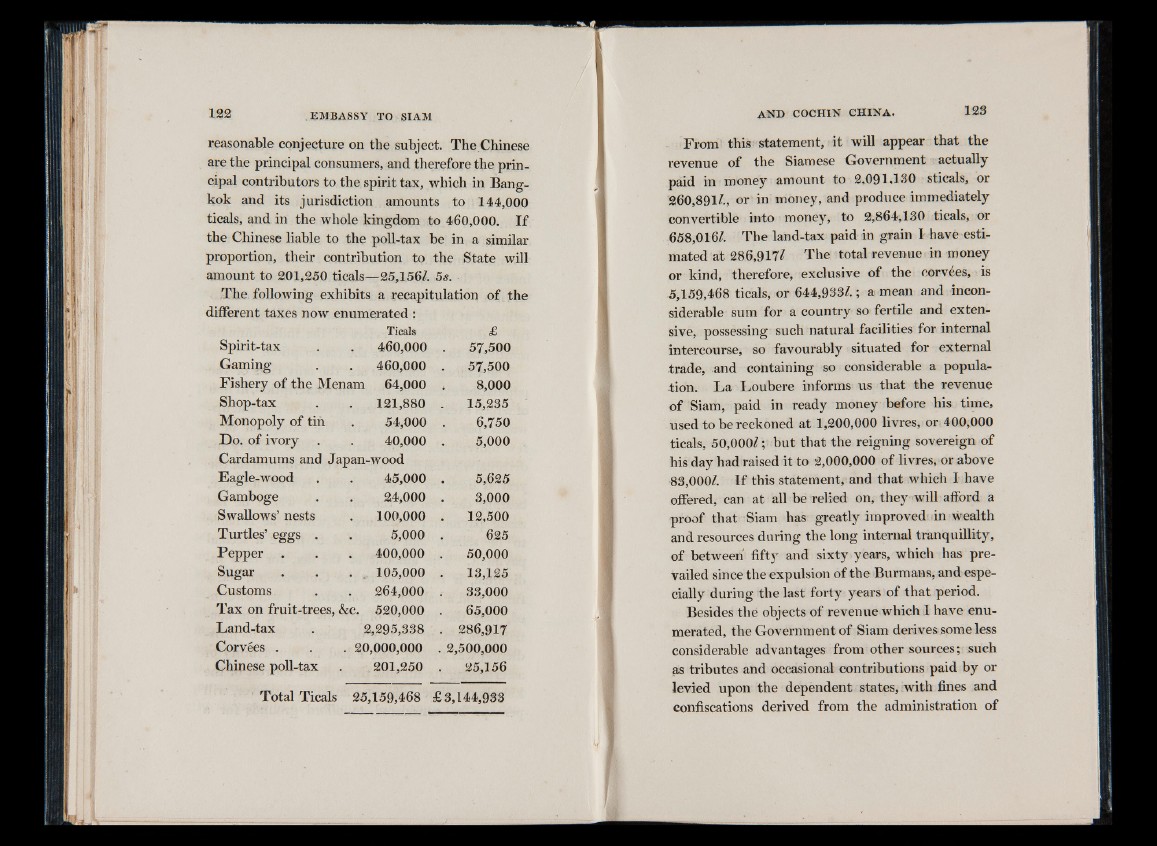
reasonable conjecture on the subject. The Chinese
are the principal consumers, and therefore the principal
contributors to the spirit tax, which in Bangkok
and its jurisdiction amounts to 144,000
ticals, and in the whole kingdom to 460,000. I f
the Chinese liable to the poll-tax be in a similar
proportion, their contribution to the State will
amount to 201,250 ticals—25,1561. 5s.
The following exhibits a recapitulation of the
different taxes now enumerated :
Ticals £
Spirit-tax 460,000 57,500
Gaming 460,000 57,500
Fishery of the Menam 64,000 8,000
Shop-tax 121,880 15,235
Monopoly of tin 54,000 6,750
Do. of ivory 40,000 5,000
Cardamums and Japan-wood
Eagle-wood 45,000 5,625
Gamboge 24,000 3,000
Swallows’ nests 100,000 12,500
Turtles’ eggs . 5,000 625
Pepper 400,000 50,000
Sugar . . . ^ 105,000 13,125
Customs 264,000 33,000
Tax on fruit-trees, &c. 520,000 65,000
Land-tax . 2,295,338 . 286,917
Corvées . . . 20,000,000 . 2,500,000
Chinese poll-tax 201,250 . 25,156
Total Ticals 25,159,468 £3,144,933
F r o m this statement, it will appear that the
revenue of the Siamese Government actually
paid in money amount to 2,091.130 sticals, or
260,891/., or in money, and produce immediately
convertible into money, to 2,864,130 ticals, or
658,016/. The land-tax paid in grain I have estimated
at 286,917/ The total revenue in money
or kind, therefore, exclusive of the corvées, is
5,159,468 ticals, or 644,933/. ; a mean and inconsiderable
sum for a country so fertile and extensive,
possessing such natural facilities for internal
intercourse, so favourably situated for external
trade, and containing so considerable a popular-
lion. La Loubere informs us that the revenue
of Siam, paid in ready money before his time,
used to be reckoned at 1,200,000 livres, or 400,000
ticals, 50,000/ ; but that the reigning sovereign of
his day had raised it to 2,000,000 of livres, or above
83,000/. If this statement, and that which I have
offered, can at all be relied on, they will afford a
proof that Siam has greatly improved in wealth
and resources during the long internal tranquillity,
of between fifty and sixty years, which has prevailed
since the expulsion of the Burmans, and especially
during the last forty years of that period.
Besides the objects of revenue which I have enumerated,
the Government of Siam derives some less
considerable advantages from other sources; such
as tributes and occasional contributions paid by or
levied upon the dependent states, with fines and
confiscations derived from the administration of